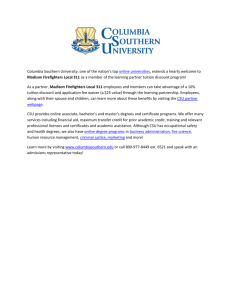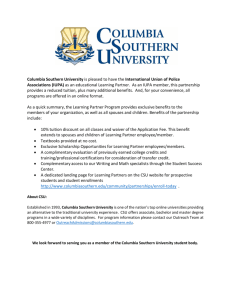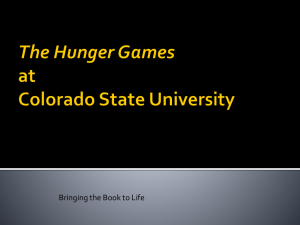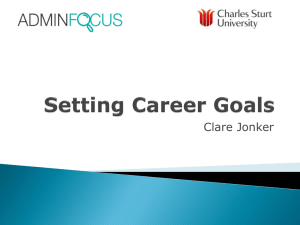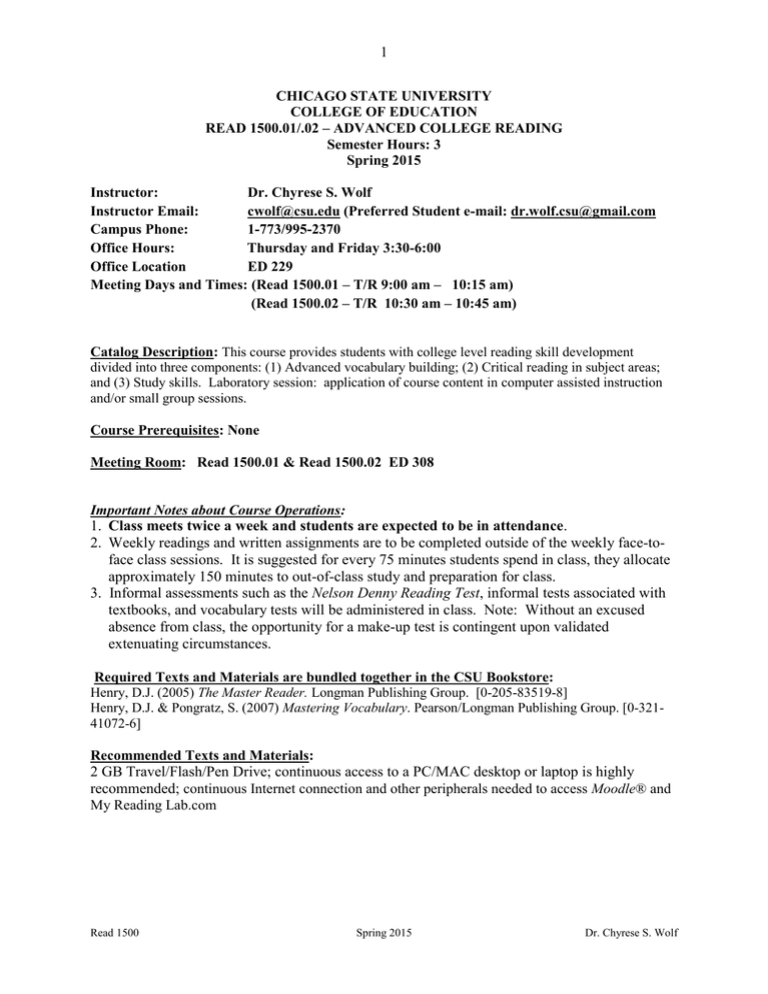
1
CHICAGO STATE UNIVERSITY
COLLEGE OF EDUCATION
READ 1500.01/.02 – ADVANCED COLLEGE READING
Semester Hours: 3
Spring 2015
Instructor:
Dr. Chyrese S. Wolf
Instructor Email:
cwolf@csu.edu (Preferred Student e-mail: dr.wolf.csu@gmail.com
Campus Phone:
1-773/995-2370
Office Hours:
Thursday and Friday 3:30-6:00
Office Location
ED 229
Meeting Days and Times: (Read 1500.01 – T/R 9:00 am – 10:15 am)
(Read 1500.02 – T/R 10:30 am – 10:45 am)
Catalog Description: This course provides students with college level reading skill development
divided into three components: (1) Advanced vocabulary building; (2) Critical reading in subject areas;
and (3) Study skills. Laboratory session: application of course content in computer assisted instruction
and/or small group sessions.
Course Prerequisites: None
Meeting Room: Read 1500.01 & Read 1500.02 ED 308
Important Notes about Course Operations:
1. Class meets twice a week and students are expected to be in attendance.
2. Weekly readings and written assignments are to be completed outside of the weekly face-toface class sessions. It is suggested for every 75 minutes students spend in class, they allocate
approximately 150 minutes to out-of-class study and preparation for class.
3. Informal assessments such as the Nelson Denny Reading Test, informal tests associated with
textbooks, and vocabulary tests will be administered in class. Note: Without an excused
absence from class, the opportunity for a make-up test is contingent upon validated
extenuating circumstances.
Required Texts and Materials are bundled together in the CSU Bookstore:
Henry, D.J. (2005) The Master Reader. Longman Publishing Group. [0-205-83519-8]
Henry, D.J. & Pongratz, S. (2007) Mastering Vocabulary. Pearson/Longman Publishing Group. [0-32141072-6]
Recommended Texts and Materials:
2 GB Travel/Flash/Pen Drive; continuous access to a PC/MAC desktop or laptop is highly
recommended; continuous Internet connection and other peripherals needed to access Moodle® and
My Reading Lab.com
Read 1500
Spring 2015
Dr. Chyrese S. Wolf
2
Course Objectives: Students will develop skills and learn to…
Assess own strengths & weaknesses in Reading skills.
Develop routines for academic reading, writing, note-taking, test preparation, study skills,
etc.
Recognize the relationship between reading and writing.
Recognize benefits and pitfalls of group decision making.
Acquire basic skills for effective communication in teams.
Cultivate a curiosity for new experiences and skills.
Learning Outcomes (Direct & Indirect) and Related PACTS Themes in Conceptual Framework:
Students will be able to:
set personal learning goals and strive to meet them; [Assessment/Indirect Learning Outcome]
learn to manage time efficiently; [Assessment/Indirect Learning Outcome]
develop the skills necessary to achieve a passing score on the Nelson Denny Reading Exam.
[Assessment /Direct Learning Outcome]
Students will be able to:
strengthen vocabulary by using context clues, a dictionary, and structural analysis to determine
the meaning of unfamiliar words;
improve comprehension through learning to identify main ideas and important details;
write summaries of reading passages, demonstrating a thorough understanding of the writer’s
message;
practice basic study skills;
distinguish between fact and opinion; [All in this set are: Content/Direct Learning Outcome]
CSU Credit Hour & Time Expectation
For every credit hour of direct instruction in any format (face-to-face, hybrid, online), it is expected that
the student will spend a minimum of two additional hours on out-of-class student work assignments; in
addition to studying.
Course Assessment and Standards Matrix:
Name of
Assessment
Scoring Guide
COE 2:
Content
Knowledge
Assessment
(Related
Course
Outcome)
Weekly
classwork and
homework
assignments
Program
Objectives
This Course Serves
as a Service Course
for Numerous
Programs in the
COE and CAS
This Course Serves
as a Service Course
for Numerous
Programs in the
COE and CAS
COE 2:
Content
Knowledge
Periodic
vocabulary or
chapter tests
COE 2:
Content
Knowledge
Computer
assisted
instruction
This Course Serves
as a Service Course
for Numerous
Programs in the
COE and CAS
COE 2:
Content
Mini-research
paper
This Course Serves
as a Service Course
Read 1500
Course
Objective &
Student
Outcomes
1
Key Assessments (in
LiveText®)
No
2, 3, & 5
No
4
No
Student must
perform at or
Spring 2015
Student
Performance
Criteria
Standards Met
& Conceptual
Framework
* Students must
perform at or
above the
Acceptable
level.
* Students
must perform
at or above the
Acceptable
level.
NCATE 1
PACTS
* Students
must perform
at or above the
Acceptable
level.
NCATE 1
PACTS
* Students
must perform
NCATE 1
PACTS
NCATE 1
PACTS
Dr. Chyrese S. Wolf
3
Knowledge
COE 2:
Content
Knowledge
for Numerous
Programs in the
COE and CAS
Qualifying
reading exam
This Course Serves
as a Service Course
for Numerous
Programs in the
COE and CAS
above
acceptable
level
7&8
No
at or above the
Acceptable
level.
* Students
must perform
at or above the
Acceptable
level.
NCATE 1
PACTS
Grade Point Distribution –
Contingent upon a passing score achieved on the Nelson Denny Reading Exam
(12.0)class/homework assignments and quiz scores:
ASSIGNMENTS, QUIZZES
PLUS the Average of Scores
75.0% - 84.0%
85.0% - 94.0%
95.0% - 100%
LETTER GRADE
EQUALS the final
grade in Read 1500
C
B
A
Course Policies:
Attendance:
University policy states students will automatically be dropped from class with a grade of “WA”
(Withdraw Attending) upon attaining four (4) absences.
Four [4] absences during a 16 week semester is the equivalent of two weeks of class.
In accordance with university policy, three (3) “excused” absences are permitted with
substantiating documentation.
Habitual tardiness is discouraged. Three (3) tardies = one (1) Absence
Each additional absence may reduce a student’s final grade by one letter.
Completion of Assignments, Unit Tests and Quizzes
All assignments, unit tests, and quizzes must be completed and submitted on time in order to take
the Reading Qualifying Exam AKA Nelson Denny Reading Test
No late work will be accepted without prior approval from the instructor.
Students will not be permitted to make up an exam/test/quiz if they are absent on the day a test is
administered unless the student has an “excused absence”.
The Reading Qualifying Exam - Nelson Denny Reading Test - will be administered twice
during the semester:
PRE-TEST EXAM
FINAL EXAM
NOTE: The minimum passing score is 12.0 on the Nelson Denny
The Reading Qualifying Exam – Nelson Denny Reading Test - will not be administered on an
alternate date unless the student has a verifiable reason for missing the original exam date.
Students not taking the Reading Qualifying Exam – Nelson Denny Reading Test, will receive a
failing grade = “F”.
Read 1500
Spring 2015
Dr. Chyrese S. Wolf
4
Corrections and amendments to Course Syllabus:
The instructor reserves the right to make corrections and amendments to the syllabus and course
calendar during the semester. All changes will be discussed with students in class and
communicated electronically through the Announcement feature of “Moodle” or via CSU Email.
Protocal:
Students are expected to notify the professor of any absence, anticipated late arrival, or early
dismissal prior to class. Notification should be sent to the professor’s gmail account. Always
include the name and section of the course when communicating with the professor.
Gentlemen are expected to wear their pants at waist-line; not below the waist-line. Also,
gentlemen must remove their hats or caps upon entry to the classroom.
LIVETEXT PROGRAM/POLICY: All students are required to purchase a copy of LiveText either from the CSU
Bookstore or from www.livetext.com. This program is needed for downloading all the key written
projects/assessments completed in this course into your course shell for grading purposes.
MOODLE COURSE SHELL: All students are required to log into their Moodle Course Shell, for the purpose of
downloading copies of documents/handouts related to this course. Exams assigned in relation to this course will also
be uploaded and completed within your Moodle course shell. You will need your CSU email username and password
to log into Moodle.
UNIVERSITY AND COLLEGE OF EDUCATION POLICIES
Statement from Abilities Office: Students with a disability who require reasonable accommodations to
fully participate in this course should notify the instructor within the first two weeks of the semester. Such
students must be registered with the Abilities Office which is located in the Cordell Reed Student Union
Building, Room 198. The telephone number is 773.995.4401. Accommodations may be requested at any
time, but they are not retroactive.
Emergency Procedure Request: In order to maximize preparedness in the case of an emergency,
students who may need assistance should an evacuation be necessary are asked to inform their instructors
at the beginning of each semester. This request is made to improve the safety of all members of the CSU
Community.
Plagiarism and Academic Misconduct : ‘Academic misconduct includes but is not limited to cheating,
encouraging academic dishonesty, fabrication, plagiarism, bribes, favors, threats, grade tampering, nonoriginal work, and examination by proxy. Procedures regarding academic misconduct are delineated in
“Student Policies and Procedures” article X, section 2. If an incident of academic misconduct occurs, the
instructor has the option to notify the student and adjust grades downward, award a failing grade for the
semester, or seek further sanctions against the student.’
Academic Warnings: Student progress is monitored throughout each semester, and progress indicators
are posted to Moodle / CSU X-Press during the 5th, 9th, and 13th weeks of the semester, as listed in the
Academic Calendar. Instructors and academic advisors usually communicate with students if problems
arise, but it is the responsibility of the student to check, and to take immediate action when necessary to
improve the grade. If you receive “SP” (satisfactory progress), you are on track to successfully complete
Read 1500
Spring 2015
Dr. Chyrese S. Wolf
5
the course. Otherwise, if there are issues related to attendance, missing assignments and exams, and/or
limited progress, please contact the instructor and your academic advisor as soon as possible.
Electronic Harassment/Cyberbullying Policy: All members of the CSU community are required to follow
the Electronic-Harassment/Cyberbullying Policy at
http://www.csu.edu/boardoftrustee/documents/CyberbullyingPolicy.pdf.
COE Turnitin Policy: The College of Education considers plagiarism a violation of academic integrity and
will address all violations of the policy. Plagiarism is a serious matter, subject to disciplinary action and/or
dismissal from a program, the College of Education or the university. The instructor reserves the right to run
any assignment through Turnitin.
Children in the College: Unattended children are not permitted in the College of Education nor are
children of any age allowed in the classrooms during periods of classroom instruction.
Laptop Policy: All students enrolled in this course are required to have access to a laptop computer. We encourage
you to bring your own laptop to all class sessions so that you can fully experience the integration of technology into
your education.
College Electronic Device Policy: All cell phones must be silenced or set to vibrate during class. If you make or
accept a call or text message during class time, you must leave the classroom for the duration of the class. Unless
specifically allowed for class or examination, the use of any electronic devices is prohibited. If an unapproved
electronic device is visible during testing, or if you leave the classroom during testing for any reason, you will not be
able to complete the test. Any violation of this policy on the use of electronic devices will affect your grade and
standing in the program according to course, department, college, and university regulations and guidelines.
Additional university and college policies can be found online at www.csu.edu.
COLLEGE OF EDUCATION CONCEPTUAL FRAMEWORK:
The College of Education's conceptual framework serves as the model for preparing all
candidates to succeed in helping all urban children learn. This preparation is characterized and
distinguished by five core themes: (1) Professionals who exhibit appropriate skills, dispositions and
best practices; (2) Assessments of teaching and learning that are consistent and frequent: (3)
contextualized teaching experiences; (4) Technology —integrated curricula and instructional
delivery: and (5) Standards-based teaching and learning.
The course relates to the College of Education's Conceptual Framework because it adheres to
professional standards of leadership and related aspects of administrative behavior for
enrichment and promotion of contextualized experiences at K-12 and post-secondary levels. In
addition, the course has the necessary assessment components and activities to ensure that each
candidate acquires legal knowledge and technological skills (via Live-text and legal research),
including the dispositions of leadership, which are associated with educational institutions and is
essential for organizational partnerships.
PROFESSIONAL STANDARDS:
National Council for Accreditation of Teacher Education (NCATE) <http://www.ncate.org>
Chicago State University Conceptual Framework PACTS Strands
Read 1500
Spring 2015
Dr. Chyrese S. Wolf
6
BIBLIOGRAPHY:
Cutler, Wade (2003). Triple your Speed. New York: Pocket Books.
American Heritage Dictionary (2003). 100 Words every high school graduate should know.
Boston: Houghton Mifflin.
Hancock, Ophelia (2007). Reading skills for college students (7th edition). New Jersey:
Pearson/Prentice Hall.
Henry, D.J. (2005) The master reader. Longman Publishing Group
Henry, D.J. & Pongratz, S. (2007) Mastering vocabulary. Pearson/Longman Publishing Group
Kidd, S.M. (2009) The secret life of bees. Penguin Publishing.
Lee, Linda (2008). Empowered college reading: motivation matters. New York:
McGraw-Hill.
LiveText. https://college.livetext.com/misk5/c1/activate
McGrath, Jane (2004). Basic skills and strategies for college reading: A Text with
Thematic Reader (2nd Edition). New Jersey: Pearson/Prentice Hall.
McWhorter, Kathleen (2007). College reading and study skills. New York: Longman.
MyReadingLab. New Jersey: Pearson/Prentice Hall. https://www.MyReadingLab.com
Novis, C. (2011) The pearson textbook reader, [3rd Edition]. Longman Publishing Group.
Smith, Brenda D. (2007). Breaking through:college reading. New York: Longman.
Smith, Brenda D. Bridging the gap: college reading (8Th Edition). New York: Longman.
Troyka, Lynn Q. (2003) Structured reading. New Jersey: Prentice Hall.
Read 1500
Spring 2015
Dr. Chyrese S. Wolf
7
Course Schedule
Date/
Topics
Week#
1/13
Course Overview
1/15
Assignment
1/20
1/22
Mastery Reading Test- Nelson Denny, Textbook
Features (Master Reader Ch. 1), Vocabulary
Development,
1/27
1/29
2/3
2/5
2/10
2/12
2/17
2/19
2/24
2/26
3/3
3/5
3/10
3/12
3/17
3/19
3/24
3/26
Vocabulary Development
Master Reader- Vocabulary Skills Ch. 2
Vocabulary Development, Master Reader Ch. 3Stated Main Ideas, Thesis Statement
Master Reader Ch. 4- Implied Main Ideas and
Central Idea
Vocabulary Development,
Master Reader Ch. 8 Thought Patterns
Vocabulary Development,
Master Reader Ch. 9 Fact and Opinion
Vocabulary Development,
Master Reader Ch. 10- Tone and Purpose
Vocabulary Development,
Master Vocabulary
Spring Recess- No Classes Meet
3/31
4/2
4/7
4/9
4/14
4/16
4/21
4/23
4/28
4/30
Vocabulary Development,
Master Vocabulary
Vocabulary Development,
Master Vocabulary
Vocabulary Development,
Master Vocabulary
Prepare for final administration of Nelson Denny
Reading Test
Read 1500
Master Vocabulary
Master Reader Ch. 1- The
reading process and SQ3R
Vocabulary
Nelson Denny Mastery
Reading Test
WD Grades Due to
University for NonAttendance (1/21)
1st Academic Warning
Spring Recess- No Classes
Meet
2nd Academic Warning
3/27 is last day to withdraw
from class with a grade of W.
Nelson Denny Mastery
Testing
3rd Academic Warning
Final Class- Take Nelson
Denny Exam
Spring 2015
Dr. Chyrese S. Wolf


